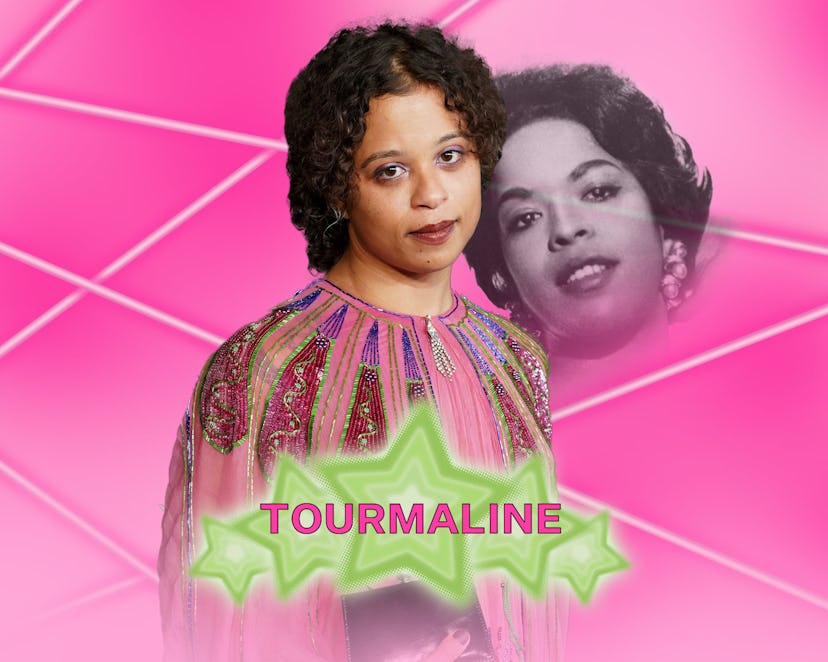That's What I'm Talking About
Tourmaline Knows The Real Power Of Glamour Thanks To Della Reese
The author of Marsha: The Joy and Defiance of Marsha P. Johnson says Reese’s iconic turn in Harlem Nights showed her that fashion and beauty can be more than superficial.

Twenty years ago, Tourmaline — a New York-based artist, filmmaker, author, and organizer — began looking into the life and legacy of Marsha P. Johnson, a Black trans performer and activist who left an indelible mark on the city’s queer community. “Before I was an artist, I was organizing around health care, welfare, housing, police, and prisons. I started [asking] so many of these questions of ‘Who are people who came before me who made campaigns that changed the world?’” Tourmaline says. “And Marsha always was the answer.”
Outside of her world, however, Johnson’s impact wasn’t widely known. So Tourmaline worked to unearth and give voice to the icon’s story, through art projects like her 2018 short film with Sasha Wortzel, Happy Birthday, Marsha! — and now, with a definitive biography, Marsha: The Joy and Defiance of Marsha P. Johnson. With LGBTQ+ rights increasingly under attack, the book is also a timely reminder of what it takes to make change even in the bleakest of circumstances. “Conditions don’t get to determine how we feel about ourselves, and they certainly don’t get to determine what we know to be possible,” Tourmaline, 41, says. “I think Marsha’s story consistently showed that she was using harsh conditions and the challenges that she faced in her daily life as launching pads to dream beyond them.”
Below, Tourmaline reflects on one of her formative divas — another icon who, like Johnson, had to “make a way out of no way” to live the life she wanted.
I was around 8 years old when I first saw Della Reese in Harlem Nights on VHS. It’s really not a movie that an 8-year-old should be watching, and I don’t know why anyone thought that was a great idea for me, but I’m glad they did, because it had a profound effect on my life.
In the film, Reese plays the head mother of a Prohibition-era brothel, and she carries herself with this enormous sense of power. Everyone’s dialed in on her. She’s deviant, but she’s not ashamed of it at all. She has this energy of “I’m still f*cking here.” I’d compare her to my friend and forebear Miss Major: totally unapologetic about sex work, totally unapologetic about being an incredibly powerful woman. There’s this scene where Eddie Murphy’s character is trying to pick on her a little bit, and she, like, goes outside and pummels his ass. It’s incredible.
The way Reese holds her own against everyone on screen — in Harlem Nights, but in the rest of her work, too — really taught me something. Reese was a Black actor and singer born in Detroit in 1931, so she came up at a time when she really had to make a way out of no way to build a career as a performer. Getting to see her live her craft really shaped me. Watching her, I knew: That’s exactly who I want to be. I want to be that kind of powerful person.
Reese taught me about glamour, too — there’s something special in the way she moves and owns her beauty. At the time, I definitely carried myself in that mold. I would quote her words all the time. She has a particular walk; I had a little walk. It’s the theatricality of it all. I didn’t put my feelings into language back then, it was just who I was.
“Her clothes weren’t just throwaway things. They were part of her power.”
And I found euphoria in clothing. We were friends with an all-girl family, and we would get their hand-me-downs. I’d find something that I liked from that, like a sweater that popped out or stirrup pants. It was giving horse girl, honestly. The clothes thrilled me, even if they weren’t the period looks from Harlem Nights. The Prohibition looks, what all the brothel girls and all gamblers were dressed in — they were everything. Reese’s costumes were the most glamorous ones in the film, and I knew that was important. Her clothes weren’t just throwaway things. They were part of her power.
Harlem Nights became my go-to movie after that first watch. Even though I haven’t seen it in 20 years, I still know every line.